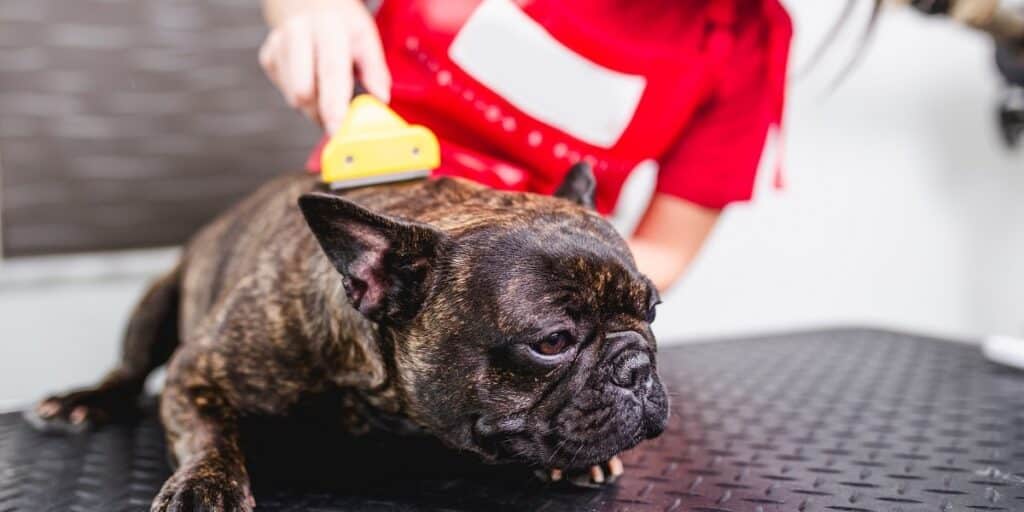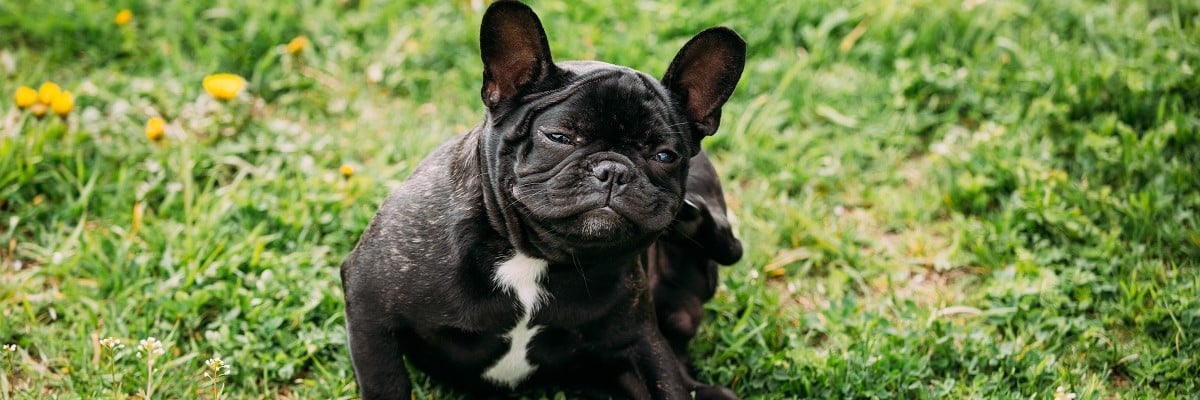Bald Spots in French Bulldogs: As a French Bulldog owner, you love your pet’s distinct features and personality. However, you might notice that your Frenchie is experiencing hair loss or developing bald spots. This article will explore some of the common causes of bald spots in French Bulldogs and suggest treatment options to maintain your pet’s health and appearance.
Allergies can cause hair loss in French Bulldogs due to skin irritation and excessive scratching. Common allergens for dogs include pollen, dust, mold, certain foods, and fleas. In this section, we will discuss how to identify allergies in your Frenchie and explore various treatment options in more detail.
1.1 Identifying Allergies
Signs your Frenchie may have allergies include:
- Itchiness: Your Frenchie may feel uncomfortable and itch more frequently than usual, especially in areas where the skin is irritated.
- Excessive scratching or biting: In an attempt to relieve the itchiness, your French Bulldog may scratch or bite at their skin, leading to further irritation and hair loss.
- Red or irritated skin: Allergic reactions can cause inflammation, making your Frenchie’s skin appear red and irritated.
- Hair loss: The combination of excessive scratching and inflamed skin may result in hair loss and bald spots.
If you notice these symptoms in your French Bulldog, it’s essential to consult with a veterinarian to determine the cause of the allergy and the best course of action.
1.2 Treatment Options
Treatments for allergies in French Bulldogs may include:
- Antihistamines or corticosteroids to reduce itching and inflammation[1]: Medications like Benadryl or Prednisone can help to alleviate your Frenchie’s itchiness and discomfort by reducing inflammation and suppressing the immune system’s response to allergens.
- Topical treatments, such as medicated shampoos or creams: These products can be applied directly to the skin to soothe irritation and promote healing. Look for shampoos and creams that contain ingredients like hydrocortisone or oatmeal, which can help to relieve itching and inflammation.
- Elimination diets to identify and avoid food allergens: If your Frenchie’s allergies are suspected to be food-related, an elimination diet can help identify the specific allergens. This process involves removing potential allergens from your dog’s diet and then gradually reintroducing them to pinpoint the cause of the allergic reaction.
- Flea control and prevention: Flea allergies are common in dogs and can cause significant discomfort. Ensure your Frenchie is on a regular flea prevention regimen, which may include oral medications, topical treatments, or flea collars.
Your veterinarian can help you choose the most suitable treatment for your Frenchie’s specific allergy, ensuring your pet’s comfort and well-being.

Section 2: Hormonal Imbalances
Hormonal imbalances, such as Cushing’s disease or hypothyroidism, can lead to hair loss in French Bulldogs. These conditions affect the production and regulation of hormones, which can impact your pet’s skin and coat health[3]. In this section, we will discuss how to identify hormonal imbalances in your Frenchie and explore various treatment options in more detail, along with providing some helpful tips and suggestions.
2.1 Identifying Hormonal Imbalances
Signs your Frenchie may have a hormonal imbalance include:
- Weight gain or loss: Sudden or unexplained changes in your French Bulldog’s weight can be indicative of a hormonal imbalance.
- Changes in appetite or thirst: An increase or decrease in your Frenchie’s appetite or thirst levels could be a sign of a hormonal issue.
- Lethargy or decreased activity: Hormonal imbalances can cause your French Bulldog to become lethargic or less active than usual.
- Hair loss or thinning: Hormonal issues can lead to hair loss, thinning, or bald spots on your Frenchie’s coat.
Tips for identifying hormonal imbalances:
- Keep a close eye on your Frenchie’s behavior, appetite, and energy levels, and note any significant changes.
- Regularly monitor your French Bulldog’s weight and body condition.
- Consult your veterinarian if you notice any symptoms that may indicate a hormonal imbalance.
2.2 Treatment Options
Treatments for hormonal imbalances in French Bulldogs may include:
- Medication to regulate hormone levels: Depending on the specific hormonal issue, your veterinarian may prescribe medication to help regulate your Frenchie’s hormone levels. For example, dogs with hypothyroidism may be prescribed levothyroxine to increase thyroid hormone production[4].
- Dietary changes to support overall health: A well-balanced diet can help support your French Bulldog’s overall health, including their hormonal balance. Consult with your veterinarian to ensure your Frenchie’s diet is suitable for their specific needs.
- Regular veterinary monitoring to assess treatment effectiveness: It is essential to maintain regular check-ups with your veterinarian to monitor your Frenchie’s progress and adjust treatment plans as necessary.
Tips for managing hormonal imbalances:
- Follow your veterinarian’s recommendations for medications and dietary changes.
- Ensure your French Bulldog receives regular exercise to support overall health and well-being.
- Be patient, as it may take time for your Frenchie’s hormone levels to stabilize and for their coat to regrow.
Section 3: Pressure Sores
Pressure sores, also known as bedsores or decubital ulcers, can cause hair loss in French Bulldogs. These sores develop when your dog’s skin experiences constant pressure and friction, leading to hair loss and thickened skin[4]. In this section, we will discuss how to identify pressure sores in your Frenchie, explore various treatment options in more detail, and provide helpful tips and suggestions in a table format.
3.1 Identifying Pressure Sores
Signs your Frenchie may have pressure sores include:
- Hair loss on bony areas, such as elbows or hips
- Thickened skin or calluses
- Open sores or ulcers
Tips for Identifying Pressure Sores:
| Tip | Description |
| Check bony areas regularly | Examine your Frenchie’s elbows, hips, and other bony areas for hair loss or thickened skin. |
| Monitor your dog’s sleeping and resting habits. | Observe if your French Bulldog prefers to lie on one side or specific areas, causing pressure. |
| Note changes in skin condition | Keep track of any changes in your Frenchie’s skin, such as redness, inflammation, or open sores. |
3.2 Treatment Options
Treatments for pressure sores in French Bulldogs may include:
- Providing a soft, supportive bed or padding
- Regularly repositioning your dog to relieve pressure on affected areas
- Applying protective bandages or clothing to reduce friction
- Seeking veterinary care if sores become infected or worsen
Tips for Managing Pressure Sores:
| Tip | Description |
| Choose a supportive bed | Provide your Frenchie with a soft, padded bed to help distribute their weight and reduce pressure points. |
| Encourage movement and repositioning. | Encourage your French Bulldog to change positions frequently to help prevent pressure sores from forming. |
| Keep affected areas clean and dry. | Clean and dry any open sores or pressure points regularly to promote healing and prevent infection. |
| Consult a veterinarian if sores worsen. | Seek professional veterinary care if pressure sores do not improve or become infected. |
Section 4: Infections or Infestations
Infections or infestations, such as ringworm, mange, or fleas, can cause hair loss in French Bulldogs. These conditions can lead to irritation and inflammation, resulting in hair loss and other skin issues[5]. In this section, we will discuss how to identify infections or infestations in your Frenchie, explore various treatment options in more detail, and provide helpful tips and suggestions in a table format.
4.1 Identifying Infections or Infestations
Signs your Frenchie may have an infection or infestation include:
- Itching and scratching
- Red, inflamed skin
- Circular or irregular hair loss patterns
- Crusting or scaling of the skin
Tips for Identifying Infections or Infestations:
| Tip | Description |
| Regularly inspect your Frenchie’s skin | Check your French Bulldog’s skin for irritation, inflammation, or unusual hair loss patterns. |
| Monitor scratching and itching behaviour | Keep an eye on your Frenchie’s scratching or itching habits, which may indicate an underlying issue. |
| Seek veterinary advice | If you suspect an infection or infestation, consult your veterinarian for a proper diagnosis. |
4.2 Treatment Options
Treatments for infections or infestations in French Bulldogs may include:
- Topical or oral medications to treat the underlying cause
- Medicated shampoos or creams to soothe the skin
- Flea and tick prevention
- Veterinary care to address secondary infections
Tips for Managing Infections or Infestations:
| Tip | Description |
| Follow veterinary recommendations | Adhere to your veterinarian’s advice for medications, shampoos, and other treatments. |
| Regularly groom your Frenchie. | Groom your French Bulldog regularly to help remove loose hair, dirt, and debris that may irritate. |
| Keep your Frenchie’s living environment clean. | Maintain a clean living environment for your French Bulldog to reduce the risk of infections or infestations. |
| Monitor progress | Keep an eye on your Frenchie’s skin condition and seek veterinary care if there is no improvement or worsening. |

FAQ
Q: Why does my Frenchie have bald spots? A: Bald spots in French Bulldogs can result from various causes, including allergies, hormonal imbalances, pressure sores, infections, or genetics. Identifying the cause of the hair loss is essential to address the issue and provide appropriate treatment.
Q: Is it normal for Bulldogs to have bald spots? A: While some hair loss may be considered normal due to shedding, bald spots in French Bulldogs are usually a sign of an underlying issue. It’s important to consult your veterinarian if you notice bald spots on your Frenchie to determine the cause and receive guidance on care.
Q: Should I be worried if my dog has a bald spot? A: If your dog has a bald spot, it’s essential to consult with your veterinarian to identify the cause and ensure proper treatment. While some causes of hair loss may be harmless, other issues can be more severe and require medical attention.
Q: How do you treat bald spots on dogs? A: Treating bald spots on dogs depends on the underlying cause. Common treatments may include antihistamines or corticosteroids for allergies, medication to regulate hormone levels for hormonal imbalances, providing soft bedding for pressure sores, topical or oral medications for infections, or simply monitoring if the hair loss is genetic. Always consult your veterinarian for appropriate treatment options based on your dog’s specific situation.
Conclusion
Bald spots in French Bulldogs can be concerning for pet owners, but understanding the common causes and available treatment options can help you take appropriate action. Whether the hair loss is due to allergies, hormonal imbalances, pressure sores, infections, or genetics, seeking veterinary advice is crucial to ensure your Frenchie receives the proper care.
By being vigilant and addressing any issues promptly, you can help your French Bulldog maintain a healthy coat and skin, ensuring they remain happy, healthy, and looking their best.


